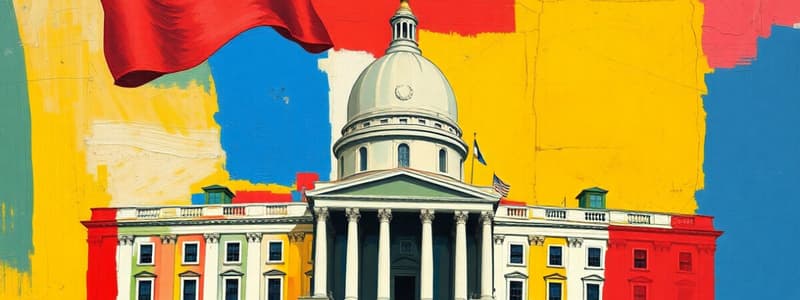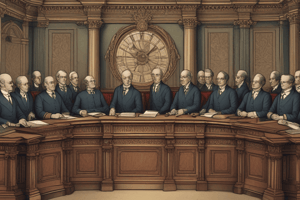Podcast
Questions and Answers
What did Thomas Jefferson believe was essential for individuals to manage their society effectively?
What did Thomas Jefferson believe was essential for individuals to manage their society effectively?
- Restricting governmental power
- Being correctly informed (correct)
- Following historical traditions
- Trusting government leaders
According to Robert L. Carneiro, what is notable about the official narrative regarding the origin of the government?
According to Robert L. Carneiro, what is notable about the official narrative regarding the origin of the government?
- It has been proven to be true
- It lacks historical evidence (correct)
- It is widely supported by historians
- It is based on documented agreements
What critique did Murray Rothbard offer regarding governments in history?
What critique did Murray Rothbard offer regarding governments in history?
- They have primarily been beneficial
- They have been responsible for societal order
- They have caused significant enslavement and murder (correct)
- They represent the will of the people
The letter suggests there is a significant difference between which two concepts?
The letter suggests there is a significant difference between which two concepts?
How does the letter describe the commonly taught origin of government?
How does the letter describe the commonly taught origin of government?
What was the initial reason the barbarian gang decided to settle in the town?
What was the initial reason the barbarian gang decided to settle in the town?
According to the content, what is the true purpose of governments in relation to taxes?
According to the content, what is the true purpose of governments in relation to taxes?
How did Carneiro and Oppenheimer characterize the rise of states?
How did Carneiro and Oppenheimer characterize the rise of states?
What did the barbarians plan to do with the tax money they collected?
What did the barbarians plan to do with the tax money they collected?
What was John Adams' view on the relationship between fear and government?
What was John Adams' view on the relationship between fear and government?
What does the author imply about the perception of royalty in history?
What does the author imply about the perception of royalty in history?
How does the author describe a castle in the context of historical royalty?
How does the author describe a castle in the context of historical royalty?
What misconception do people have about historical kings and queens according to the author?
What misconception do people have about historical kings and queens according to the author?
What is the author's perspective on the evolution of government and economic conditions?
What is the author's perspective on the evolution of government and economic conditions?
Flashcards
Social Contract Theory
Social Contract Theory
The belief that government originated from a voluntary agreement among people to provide essential services.
Critique of the Social Contract Theory
Critique of the Social Contract Theory
A critical view of the social contract theory that argues there is no historical evidence of such an agreement.
The State as a Tool of Force
The State as a Tool of Force
The idea that government arose through force and coercion, not voluntary consent.
The State
The State
Signup and view all the flashcards
Limited Government
Limited Government
Signup and view all the flashcards
Government: The Real Definition
Government: The Real Definition
Signup and view all the flashcards
Taxes: A Substitute for Raids
Taxes: A Substitute for Raids
Signup and view all the flashcards
Tyranny: The Nature of Royalty
Tyranny: The Nature of Royalty
Signup and view all the flashcards
Serfdom: A Form of Enslavement
Serfdom: A Form of Enslavement
Signup and view all the flashcards
Divine Right to Rule: A False Justification
Divine Right to Rule: A False Justification
Signup and view all the flashcards
Royalty: The Truth Behind the Glitter
Royalty: The Truth Behind the Glitter
Signup and view all the flashcards
Governmental Power: A Tool of Oppression
Governmental Power: A Tool of Oppression
Signup and view all the flashcards
Political Law: A Weapon of Control
Political Law: A Weapon of Control
Signup and view all the flashcards
The Origins of Government: From Raids to Taxes
The Origins of Government: From Raids to Taxes
Signup and view all the flashcards
The Illusion of Good Governance: A False Belief
The Illusion of Good Governance: A False Belief
Signup and view all the flashcards
Study Notes
Origin of Government: A Critical Perspective
- Thomas Jefferson believed individuals should be informed, not deprived of power.
- The commonly-held belief that governments were created voluntarily through social contracts is false, according to historians and anthropologists.
- Robert Carneiro and Franz Oppenheimer dispute the traditional narrative.
- Governments, historically, arose from acts of conquest by groups of barbarians (gangs) who then established themselves for their own gain.
- Tax collection is more like a raid in disguised form, rather than providing services as previously justified. The provision of services is used to legitimize forced taxation.
- The provision of services such as schools and courts is a strategic tactic to maintain power.
- Governments use force, often hidden, to achieve their objectives.
- America's founders viewed political power as a corrupting influence.
- John Adams: "Fear is the foundation of most governments".
- Thomas Paine: "From such beginnings of governments, what could be expected, but a continual system of war and extortion?".
- Carnegie's observation: "A close examination of history indicates that only a coercive theory can account for the rise of the state."
- Oppenheimer's statement: "Everywhere, we find some warlike tribe of wild men breaking through the boundaries of some less warlike people, settling down as nobility and founding its State."
- The historical evolution of government, from feudal kingdoms to modern states, retains its fundamental predatory nature.
- Royalty, arising from conquest, was often associated with immense wealth and power acquired through force and theft.
- Castles were strategic headquarters used for the concentration and enslavement of conquered populations. This practice gave rise to the idea of kings having divine rights to dominate others.
- The practice of political power corrupts is prevalent.
- The government's initial focus on the justice system enables it to control the application of force, making it difficult for legitimate forces to operate.
- Leaders are often unaware their actions stem from the institution's inherent predatory nature.
- Many people instinctively distrust government, yet were taught the opposite in their upbringing.
Bureaucracy and Problems
- Bureaucrats prioritize job security over problem-solving. They benefit from the problems they claim to solve.
- William Simon: Bureaucrats "have a vested interest in not having problems solved." Their jobs depend on the continued existence of problems.
- Jefferson's statement: An honest individual will likely not find pleasure in wielding power over others.
Quote Examples
- George F. Will: "Being elected to Congress is regarded as being sent on a looting raid for one's friends."
- George S. Kaufman (said in a Wall Street Journal quote): "For crossing the street to speak to you and discovering it was not you...twelve dollars."
Additional Thoughts
- The concept of the "good government" is often a delusion and history does not favor the belief that governments can reform themselves.
- The original intent of the government's establishment can be contrasted to its nature.
- Governments in their nature are inherently predators and attempts to make them "good" are futile.
- The U.S. government evolved from British feudal origins (European heritage).
Studying That Suits You
Use AI to generate personalized quizzes and flashcards to suit your learning preferences.
Description
This quiz explores the historical origins of government and the critical perspectives on social contracts and political power. It discusses the views of influential thinkers like Thomas Jefferson, Robert Carneiro, and Franz Oppenheimer on how governments arose from conquest rather than voluntary agreements. Additionally, it examines the use of force and fear in maintaining authority.




